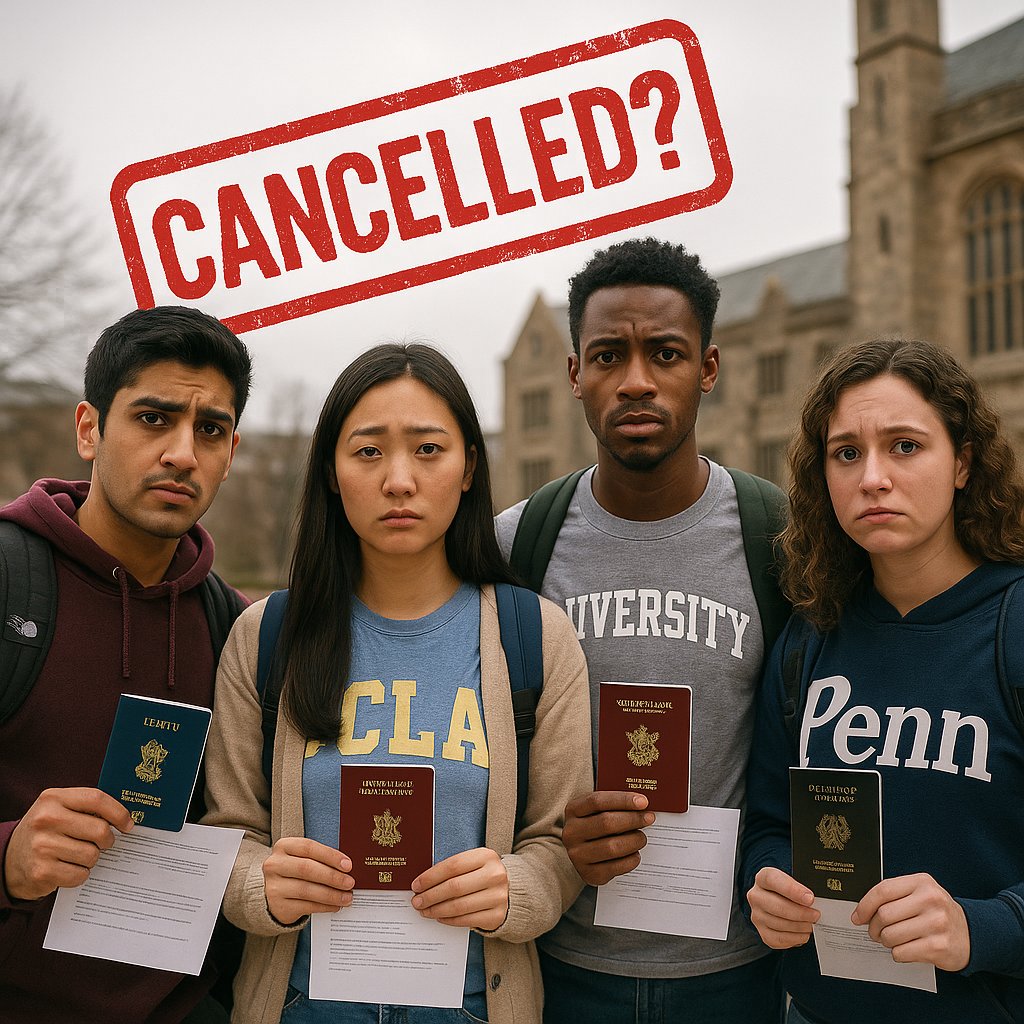- Free Consultation: (213) 251-5533 Tap Here to Call Us
The New War on F-1 Student Visas: Interview Suspensions, Mass Revocations, and What International Students Must Do to Protect Themselves

In 2025, international students in the United States are facing unprecedented challenges due to significant shifts in F-1 visa policies under the Trump administration. These changes encompass the suspension of visa interviews, mass revocations of existing visas, and heightened scrutiny of social media activity. This article delves into the legal foundations of these developments, examines recent judicial responses, and outlines strategies for international students to safeguard their legal status.
On May 27, 2025, the U.S. Department of State issued a directive halting the scheduling of new F-1, M-1, and J-1 visa interviews at U.S. embassies and consulates worldwide. This pause aims to implement expanded social media screening protocols for visa applicants. The directive instructs consular sections to refrain from adding new student or exchange visitor visa appointment capacities until further guidance is provided.
This suspension has raised concerns about potential delays in visa processing, which could impact students’ ability to commence or continue their studies in the U.S. The lack of clear timelines for resuming interview scheduling adds to the uncertainty faced by prospective international students.
Concurrently, the Trump administration has initiated widespread revocations of F-1 visas, particularly targeting Chinese students. Secretary Rubio announced an aggressive revocation policy for students with alleged connections to the Chinese Communist Party or those studying in unspecified “critical fields.” This policy has placed approximately 275,000 Chinese students in the U.S. under scrutiny, with many facing potential deportation.
The administration’s actions have extended beyond Chinese nationals. International students involved in pro-Palestinian activism have also been targeted. The State Department’s “Catch and Revoke” initiative employs artificial intelligence to monitor social media activity, leading to visa revocations for students deemed to support designated foreign terrorist organizations. AP News
Under 8 U.S.C. § 1201(i), the Secretary of State has the discretion to revoke a visa at any time. However, such revocations are not subject to judicial review, except in the context of a removal proceeding if the revocation is the sole ground for removal. Foreign Affairs Manual
Despite the broad authority granted for visa revocations, courts have intervened when due process rights are implicated. In Doe v. Bondi, a federal judge in Georgia granted a temporary restraining order preventing the Department of Homeland Security from revoking student visas without due process. The court emphasized that even non-citizens are entitled to constitutional protections when present in the U.S.
Similarly, in Harvard University v. DHS, the U.S. District Court for the District of Massachusetts issued a temporary restraining order preventing the revocation of visas for approximately 7,000 international students. The court found that the administration’s actions lacked legal justification and caused unnecessary hardship.
Given the volatile policy environment, international students should consider the following strategies to protect their legal status:
- Maintain Compliance with Visa Requirements: Ensure continuous full-time enrollment as defined by your institution and SEVP regulations.
- SEVIS Record Accuracy: Regularly verify that your SEVIS record is up-to-date and reflects your current academic status.
- Authorized Employment: Engage only in employment authorized under F-1 regulations, such as Curricular Practical Training (CPT) or Optional Practical Training (OPT).
- Exercise Caution with Social Media: Given the expanded scrutiny of social media activity, students should be mindful of their online presence. Posts that could be interpreted as supporting designated foreign terrorist organizations may lead to visa revocation.
- Seek Legal Counsel Promptly: If you receive notice of visa revocation or SEVIS termination, consult with an immigration attorney immediately. Legal avenues may be available to challenge the revocation or seek reinstatement of status.
- Engage with Institutional Resources: Maintain open communication with your institution’s international student office. They can provide guidance, assist with documentation, and liaise with immigration authorities on your behalf.
The current landscape for F-1 visa holders in the U.S. is marked by uncertainty and heightened enforcement actions. While the administration exercises broad authority over visa issuance and revocation, judicial interventions have affirmed the importance of due process protections. International students must remain vigilant, informed, and proactive in safeguarding their legal status amidst these evolving policies.
Legal Disclaimer: The information provided in this article does not constitute legal advice and is intended solely for informational purposes. Immigration laws are complex and subject to frequent change. If you are an international student concerned about your F-1 visa status, social media exposure, or potential revocation, please consult with an experienced immigration attorney as soon as possible.
For legal assistance, contact Attorney Thomas Lee at (213) 251-5533. All consultations are confidential.








